 Thu May 8 16:51:03 2014, Benedikt Würkner, Belle II, source, L3 module, No 1 of 6 room temperature measurements using Sr90 Source (single) 10x Thu May 8 16:51:03 2014, Benedikt Würkner, Belle II, source, L3 module, No 1 of 6 room temperature measurements using Sr90 Source (single) 10x
|
Sr90 Radioactive Source
No cooling
Module position: 0:0(top left)
HV Turned to +40,-40V with currents. +1.0 and -1.0 µA
N+1.25V current: 0.22A
N+2.50V current: 0.57A
P+1.25V current: 0.26A
P+2.50V current: 0.72A
Events: 200000 |
 Wed May 7 18:20:36 2014, Benedikt Würkner, Belle II, source, L3 module, No 6 of 6 room temperature measurements using Sr90 Source (multi6) 10x Wed May 7 18:20:36 2014, Benedikt Würkner, Belle II, source, L3 module, No 6 of 6 room temperature measurements using Sr90 Source (multi6) 10x
|
Sr90 Radioactive Source
No cooling
Module position: -57:-30(bottom right)
HV Turned to +40,-40V with currents. +1.2 and -1.22 µA
N+1.25V current: 0.22A
N+2.50V current: 0.56A
P+1.25V current: 0.26A
P+2.50V current: 0.70A
Events: 200000 |
 Wed May 7 17:33:21 2014, Benedikt Würkner, Belle II, source, L3 module, No 5 of 6 room temperature measurements using Sr90 Source (multi6) 10x Wed May 7 17:33:21 2014, Benedikt Würkner, Belle II, source, L3 module, No 5 of 6 room temperature measurements using Sr90 Source (multi6) 10x
|
Sr90 Radioactive Source
No cooling
Module position: -32:-30(bottom center)
HV Turned to +40,-40V with currents. +1.22 and -1.24 µA
N+1.25V current: 0.22A
N+2.50V current: 0.56A
P+1.25V current: 0.26A
P+2.50V current: 0.70A
Events: 200000 |
 Wed May 7 16:43:37 2014, Benedikt Würkner, Belle II, source, L3 module, No 4 of 6 room temperature measurements using Sr90 Source (multi6) 10x Wed May 7 16:43:37 2014, Benedikt Würkner, Belle II, source, L3 module, No 4 of 6 room temperature measurements using Sr90 Source (multi6) 10x
|
Sr90 Radioactive Source
No cooling
Module position: -5:-30(bottom left)
HV Turned to +40,-40V with currents. +1.25 and -1.26 µA
N+1.25V current: 0.22A
N+2.50V current: 0.57A
P+1.25V current: 0.26A
P+2.50V current: 0.72A
Events: 200000 |
 Wed May 7 15:53:38 2014, Benedikt Würkner, Belle II, source, L3 module, No 3 of 6 room temperature measurements using Sr90 Source (multi6) 10x Wed May 7 15:53:38 2014, Benedikt Würkner, Belle II, source, L3 module, No 3 of 6 room temperature measurements using Sr90 Source (multi6) 10x
|
Sr90 Radioactive Source
No cooling
Module position: -59:-20(top right)
HV Turned to +40,-40V with currents. +1.25 and -1.26 µA
N+1.25V current: 0.22A
N+2.50V current: 0.56A
P+1.25V current: 0.26A
P+2.50V current: 0.71A
Events: 200000 |
 Wed May 7 15:04:32 2014, Benedikt Würkner, Belle II, source, L3 module, No 2 of 6 room temperature measurements using Sr90 Source (multi6) 10x Wed May 7 15:04:32 2014, Benedikt Würkner, Belle II, source, L3 module, No 2 of 6 room temperature measurements using Sr90 Source (multi6) 10x
|
Sr90 Radioactive Source
No cooling
Module position: -32:-20(top center)
HV Turned to +40,-40V with currents. +1.23 and -1.25 µA
N+1.25V current: 0.22A
N+2.50V current: 0.56A
P+1.25V current: 0.26A
P+2.50V current: 0.71A
Events: 200000 |
 Wed May 7 14:36:29 2014, Benedikt Würkner, Belle II, source, L3 module, No 1 of 6 room temperature measurements using Sr90 Source (multi6) 10x Wed May 7 14:36:29 2014, Benedikt Würkner, Belle II, source, L3 module, No 1 of 6 room temperature measurements using Sr90 Source (multi6) 10x
|
Sr90 Radioactive Source
No cooling
Module position: -5:-20(top left)
HV Turned to +40,-40V with currents. +1.2 and -1.2 µA
N+1.25V current: 0.22A
N+2.5 V current: 0.56A
P+1.25V current: 0.26A
P+2.50V current: 0.70A
Events: 200000 |
 Sun Jul 4 05:48:36 2010, Christian Irmler, BELLE Upgrade, source, Origami 6 - module 1, run002: first analysis results 7x Sun Jul 4 05:48:36 2010, Christian Irmler, BELLE Upgrade, source, Origami 6 - module 1, run002: first analysis results 7x
|
Run name: run002
Run type: 0 (Hardware (Normal Run))
Comments:
After ~40min warmup
HV=80
90Sr 1mCi source - moved compared to run001
multi6
Max. Events=100000 Trg delay=25
Origami 6 module #1
w/o cooling
sensor: B2HPK_10938-9239_8
n-side: all 4 APVs read out
p-side: APV #0 to #3 read out, analog output of #4 and #5 were not connected to FADC board
|
 Wed Oct 7 14:24:06 2009, Dieter Uhl, BELLE Upgrade, hybrid, #5, hybrid-pitchadapter Wed Oct 7 14:24:06 2009, Dieter Uhl, BELLE Upgrade, hybrid, #5, hybrid-pitchadapter    
|
shorts at upper coat
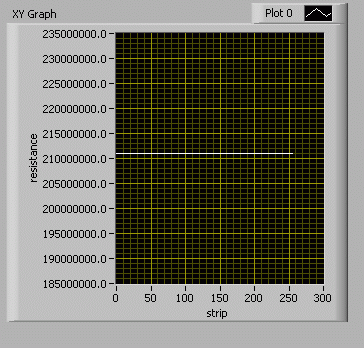
opens at upper coat
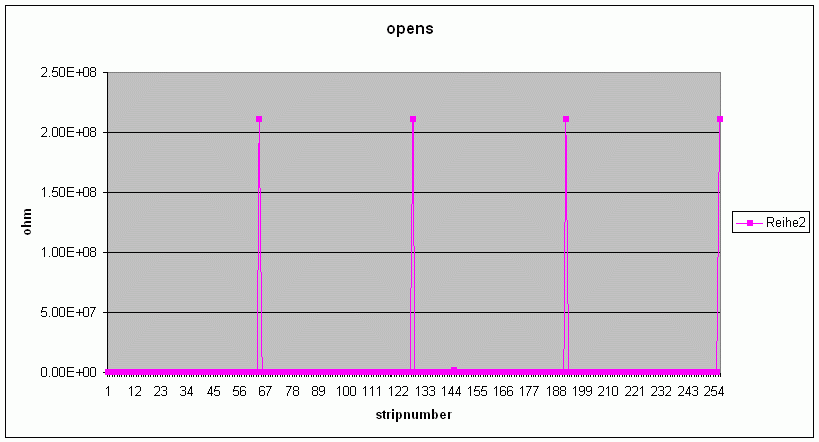
shorts at lower coat
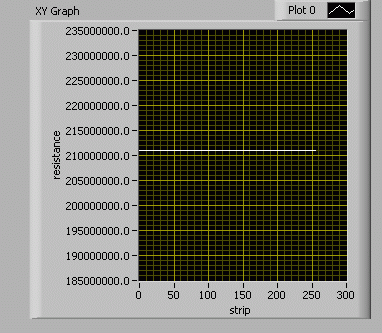
opens at lower coat
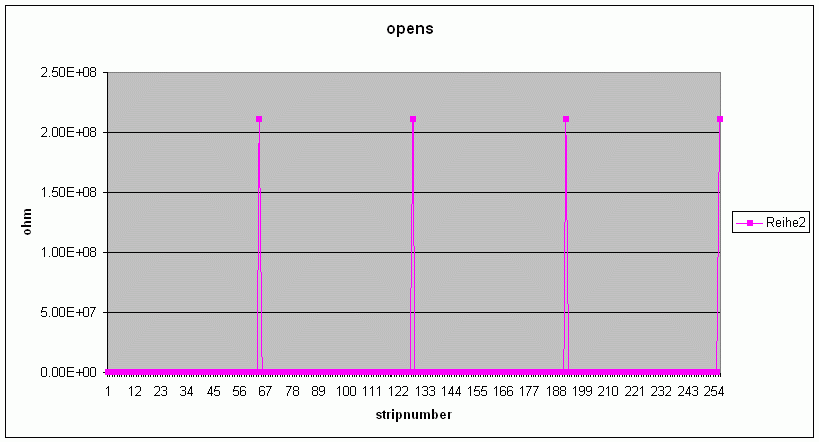
|
 Wed Oct 7 14:23:35 2009, Dieter Uhl, BELLE Upgrade, hybrid, #4, hybrid-pitchadapter Wed Oct 7 14:23:35 2009, Dieter Uhl, BELLE Upgrade, hybrid, #4, hybrid-pitchadapter    
|
opens at upper coat
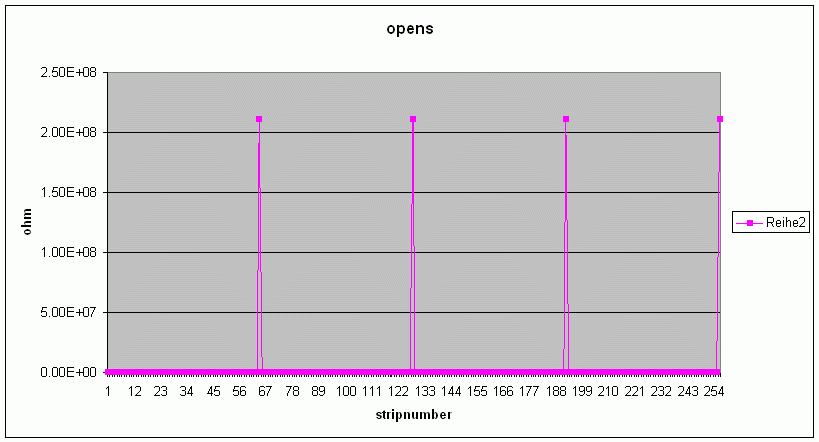
shorts at upper coat
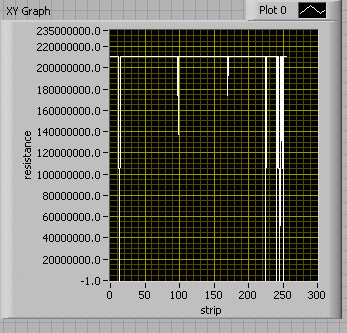
opens at lower coat
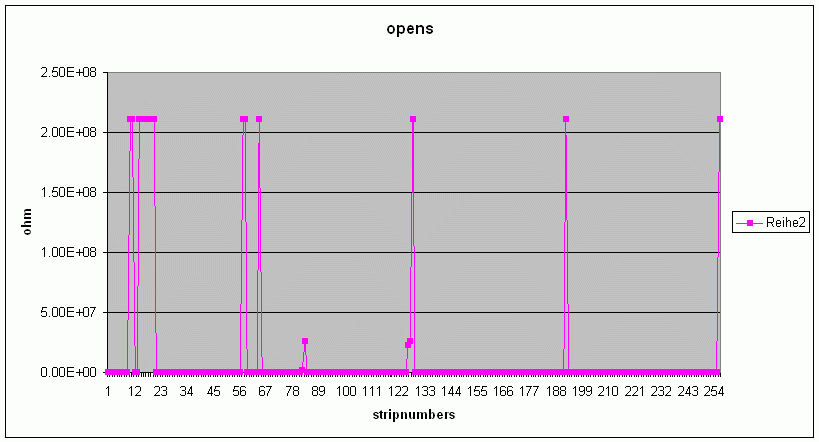
shorts at lower coat
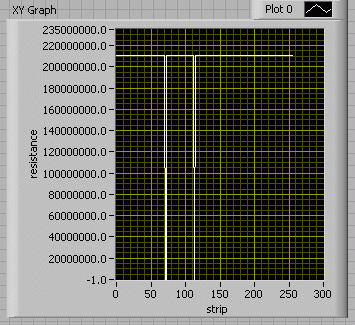
|
 Tue May 20 14:27:50 2008, Markus Friedl, BELLE Upgrade, source, micron, analysis results of source test 9x Tue May 20 14:27:50 2008, Markus Friedl, BELLE Upgrade, source, micron, analysis results of source test 9x
|
*** NOTE: AFTER THIS MEASUREMENT WE REALIZED THAT BIASING WAS NOT DONE PROPERLY
HENCE THE RESULTS BELOW ARE NOT RELIABLE
(in fact it is surprising that they are not worse) ***
Please find the results of the lab source test on the new Micron module here.
It is read out with 3 + 3 APV chips on either side.
Results table of the source measurement:
p-side n-side
Cluster signal [e] 18361 19434
Strip noise [e] 1142 1193
Avg cluster width 1.91 1.30
Single strip SNR 16.1 16.3
Cluster SNR 11.6 14.3
Strip pitch [um] 50.0 153.5
Apparently, the double metal capacitance is not so bad as expected, even though the Micron sensor does not use
the hourglass crossing scheme. Presumably the dielectric between metal 1 and 2 is rather thick (several um).
Strip noise is roughly the same on both p and n side, so the difference in Cluster SNR (*) only stems from the
unequal cluster width (which is a result of the different pitches).
Peak time precision vs SNR (last plot below) is worse compared to the values obtained with various HPK sensors
in the November 2007 beam test at KEK. However, this is a comparison of source and beam and thus might not be
significant. Let's see what we will get in the SPS beam test next week.
(*) Cluster SNR := sum(signal) / (strip_noise * sqrt(cluster_width) ) |
 Fri May 9 10:04:26 2008, Christian Irmler, SPS Testbeam June08, module, module 05/05, properties (noise, intcal), APVs bonded to the sensor 12x Fri May 9 10:04:26 2008, Christian Irmler, SPS Testbeam June08, module, module 05/05, properties (noise, intcal), APVs bonded to the sensor 12x
|
| Module tested with 1 and 2 rows bonded to the sensor, respectively.
HV = 100 V
Ibias (100 V) = 18.0 nA
Ibias (200 V) = 23.6 nA |
 Fri May 9 10:00:34 2008, Christian Irmler, SPS Testbeam June08, module, module 03/10, properties (noise, intcal), APVs bonded to the sensor 12x Fri May 9 10:00:34 2008, Christian Irmler, SPS Testbeam June08, module, module 03/10, properties (noise, intcal), APVs bonded to the sensor 12x
|
| Module tested with 1 and 2 rows bonded to the sensor, respectively.
HV = 100 V
Ibias (100 V) = 18.9 nA
Ibias (200 V) = 25.5 nA |
 Fri May 9 09:56:15 2008, Christian Irmler, SPS Testbeam June08, module, module 06/03, properties (noise, intcal), APVs bonded to the sensor 12x Fri May 9 09:56:15 2008, Christian Irmler, SPS Testbeam June08, module, module 06/03, properties (noise, intcal), APVs bonded to the sensor 12x
|
| Module tested with 1 and 2 rows bonded to the sensor, respectively.
HV = 100 V
Ibias (100 V) = 26.5 nA
Ibias (200 V) = 37.8 nA |
 Wed May 7 19:05:08 2008, Christian Irmler, SPS Testbeam June08, module, module 04/04, properties (noise, intcal), APVs bonded to the sensor 12x Wed May 7 19:05:08 2008, Christian Irmler, SPS Testbeam June08, module, module 04/04, properties (noise, intcal), APVs bonded to the sensor 12x
|
| Module tested with 1 and 2 rows bonded to the sensor, respectively.
HV = 100 V
Ibias (100 V) = 27.8 nA
Ibias (200 V) = 32.7 nA |
 Wed May 7 16:12:58 2008, Christian Irmler, SPS Testbeam June08, module, module 12/08, properties (noise, intcal), APVs bonded to the sensor 12x Wed May 7 16:12:58 2008, Christian Irmler, SPS Testbeam June08, module, module 12/08, properties (noise, intcal), APVs bonded to the sensor 12x
|
| Module tested with 1 and 2 rows bonded to the sensor, respectively.
HV = 100 V
Ibias (100 V) = 22.2 nA
Ibias (200 V) = 26.5 nA |
 Wed May 7 15:40:07 2008, Christian Irmler, SPS Testbeam June08, module, module 07/07, properties (noise, intcal), APVs bonded to the sensor 12x Wed May 7 15:40:07 2008, Christian Irmler, SPS Testbeam June08, module, module 07/07, properties (noise, intcal), APVs bonded to the sensor 12x
|
| Module tested with 1 and 2 rows bonded to the sensor, respectively.
HV = 100 V
Ibias (100 V) = 20.2 nA
Ibias (200 V) = 21.9 nA |
 Wed May 7 15:26:24 2008, Christian Irmler, SPS Testbeam June08, module, module 20/09, properties (noise, intcal), APVs bonded to the sensor 12x Wed May 7 15:26:24 2008, Christian Irmler, SPS Testbeam June08, module, module 20/09, properties (noise, intcal), APVs bonded to the sensor 12x
|
| Module tested with 1 and 2 rows bonded to the sensor, respectively.
HV = 100 V
Ibias (100 V) = 25.1 nA
Ibias (200 V) = 31.4 nA |
 Wed May 7 15:24:49 2008, Christian Irmler, SPS Testbeam June08, module, module 10/02, properties (noise, intcal), APVs bonded to the sensor 12x Wed May 7 15:24:49 2008, Christian Irmler, SPS Testbeam June08, module, module 10/02, properties (noise, intcal), APVs bonded to the sensor 12x
|
| Module tested with 1 and 2 rows bonded to the sensor, respectively.
HV = 100 V
Ibias (100V) = 19.1 nA
Ibias (200V) = 23.7 nA |
 Wed Apr 30 16:52:17 2008, Markus Friedl, BELLE Upgrade, module, micron, micron sensor glued to frame Wed Apr 30 16:52:17 2008, Markus Friedl, BELLE Upgrade, module, micron, micron sensor glued to frame
|
soeben haben wir den micron-DSSD (double metal layer) in den 2-teiligen rahmen geklebt und auf beiden seiten
temporäre kapton-stückerln aufgeklebt, über die bias appliziert werden kann. nach trocknung und bonden der
bias-verbindungen (montag, 5.5.2008) wird dieser für sensor-tests zur verfügung stehen. |
|